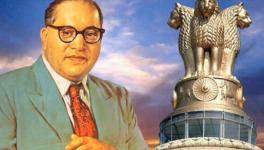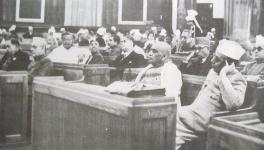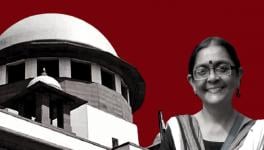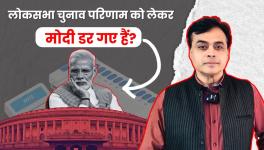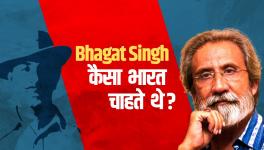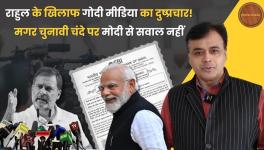Shock Therapy: 4 SC Judges Openly Vent Grievances
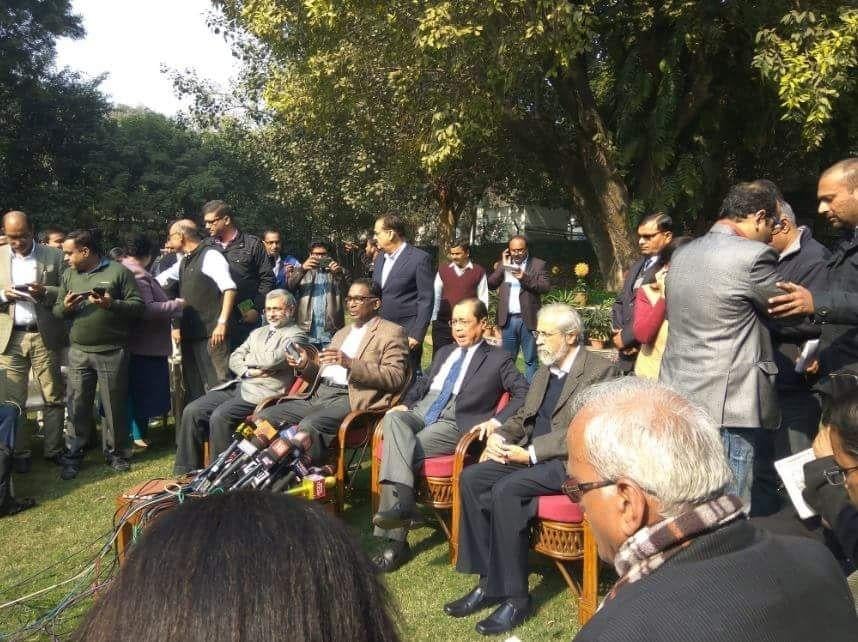
Four Judges of the Supreme Court of India held a press meet on 12 January to criticise the way the apex court is functioning. This was an unprecedented move, never before seen in India or elsewhere in the world. The four judges – seniormost after the chief justice – released a letter submitted to the Chief Justice of India Dipak Misra, alleging irregularities in the procedure and institutions of the Hon’ble Court. The four judges are: J. Chelameswar, Ranjan Gogoi, Madan B. Lokur, and Kurian Joseph. The contents of the letter outlined the traditions that the Supreme Court had adopted from the Chartered High Courts of Bombay, Madras, and Calcutta, which ‘have their roots in the Anglo Saxon jurisprudence and practice’.
The first principle that, according to the letter, has been affected is that the Chief Justice is the ‘master of the roster’ which is a necessity for the smooth administration of the higher judiciary. The position of the Chief Justice in his administrative and judicial roles is of ‘first among equals’, which means that his position vis-à-vis the other Judges of the Supreme Court is the same in all regards except regarding Constitutional duties and administrative functions. However, even in the administrative functions he does not have the position of a ‘superior’, as there are well settled conventions to determine the course of action.
The second principle is that no authority should assign itself the duty to hear matters that ought to be heard by appropriate benches, both in terms of the composition and size of the bench. This means that a Judge should not be assigned matters that another Judge is better versed with.
The letter mentioned a situation wherein one question which was decided upon in an earlier case, was dealt with again in a subsequent case by a smaller Bench. The earlier case was heard by a Constitution Bench (a five Judge bench) and the subsequent case was heard by a Division Bench (a two Judge Bench). The matter was regarding the appointment of Judges.
Below is the full text of the letter;
Dear Chief Justice,
It is with great anguish and concern that we have thought it proper to address this letter to you so as to highlight certain judicial orders passed by this court which has adversely affected the overall functioning of the justice delivery system and the independence of the High Courts besides impacting the administrative functioning of the office of the Honourable Chief Justice of India.
From the date of establishment of three chartered High Courts of Calcutta, Bombay and Madras, certain traditions and conventions in the judicial administration have been well established. The traditions were embraced by this court which came into existence almost a century after the above mentioned chartered High Courts. These traditions have their roots in the anglo-saxion jurisprudence and practice.
Once of the well settled principles is that the Chief Justice is the master of the roster with a privilege to determine the roster, necessity in multi-numbered courts for an orderly transactions of business and appropriate arrangements with respect to matter with which member/Bench of this court (as the case may be) is required to deal with which case or class of cases is to be made. The convention of recognising the privilege of the Chief Justice to form the roster and assign cases to different members/benches of the court is a convention devised for a disciplined and efficient transaction of business of the court but no a recognition of any superior authority, legal or factual of the Chief Justice over his colleagues. It is too well settled in the jurisprudence of this country that the Chief Justice is only the first amongst the equals — nothing more or nothing less. In the matter of the determination of the roster there are well settled and time honoured conventions guiding the Chief Justice, be the conventions dealing with the strength of the Bench which is required to deal with a particular case or the composition thereof.
A necessary corollary to the above-mentioned principle is the member of any multi-numbered judicial body including this court would not arrogate to themselves the authority to deal with and pronounce upon matter which ought to be heard by appropriate benches, both composition wise and strength wise with due regard to the roster fixed.
Any departure from the above two rules would not only lead to unpleasant and undesirable consequences of creating doubt in the body politic about the integrity of the institution. Not to talk about the chaos that would result from such departure.
We are sorry to say that off late the twin rules mentioned above have not been strictly adhered to. There have been instances where case has far-reaching consequences for the nation and the institution had been assigned by the Chief Justice of this court selectively to the benches ‘of their presence’ with any rationable basis for such assignment. This must be quarded against at all costs.
We are not mentioning details only to avoid embarrassing the institution but note that such departures have already damaged the image of this institution of some extent.
In the above context, we deem it proper to address you presently with regard the order dated 27th October, 2017, in R P Luthra vs. Union of India to the effect that there should be no further delay in finalising the Memorandum of Procedure in the larger public interest. When the Memorandum of Procedure was a subject matter of a decision of a Constitution Bench of this court in Supreme Court Advocates-on-Record Association and Anr. vs Union of India, [(2016) 5 SCC 1] it is difficult to understand as to how any other bench could have dealt with the matter.
The above apart, subsequent to the decision of the Constitution Bench, detailed discussions were held by collegium of five judges (including yourself) and the Memorandum of Procedure was finalised and sent by then Honourable Chief Justice of India to the Government of India in March 2017. The Government of India has not responded to the communication and in view of this silence, it must be taken that the Memorandum of Procedure as finalised by the collegium has been accepted by the Government of India on the basis of the order of this court in Supreme Court Advocates-on-Record Association (Supra). There was, therefore, no occasion for the bench to make any observation with regard to the finalisation of the Memorandum of Procedure or that issue cannot linger on for an indefinite period.
On 4th July,. 2017, a bench of seven judges of this court decided In Re Honourable Shri Justice C S Karnan [(2017) 1 SCC 1]. In that decision (referred to in R P Luthra) two of us observed that there is a need to revisit the process of appointment of judges and to set up a mechanism for corrective measures other than impeachment. No observation was made by any of the seven learned judges with regard to the Memorandum of Procedure.
Any issue with regard to the Memorandum of Procedure should be discussed in the Chief Justices’ conference and by the Full Court. Such a matter of great importance, if at all required to be taken on the judicial side, should be dealt with by none other than a Constitution Bench.
The above development must be viewed with serious concern. The Honourable Chief Justice of India is duty bound to rectify the situation and take appropriate remedial measures after a full discussion with the other members of the collegium and at a later stage, if required, with other Honourable Judges of this court.
Once the issue arising from the order dates 27th October, 2017, in R P Luthra vs Union of India, mentioned above, is adequately addressed by you and if it becomes so necessary, we will apprise you specifically of the other judicial orders passed by this court which would require to be similarly dealt with.
With kind regards,
J. Chelameswar
Ranjan Gogoi
Madam B Lokur
Kurian Joseph
Get the latest reports & analysis with people's perspective on Protests, movements & deep analytical videos, discussions of the current affairs in your Telegram app. Subscribe to NewsClick's Telegram channel & get Real-Time updates on stories, as they get published on our website.









